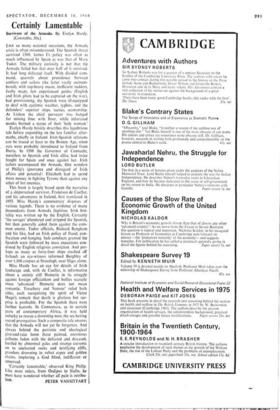Certainly Lamentable
Survivors of the Armada. By Evelyn Hardy. (Constable, 30s.) LIKE so many national occasions, the Armada crisis is often misunderstood. The Spanish threat survived 1588; James I's policy was often as much influenced by Spain as was that of Mary Tudor. The military curiosity is not that the Armada failed but that over half of it survived. It had long defeated itself. With divided com- mand, quarrels about precedence between soldiers and sailors (the latter vastly outnum- bered), with top-heavy masts, inefficient rudders, faulty maps, few experienced guides (English and Irish pilots had to be captured on the way), bad provisioning, the Spanish were ill-equipped to deal with cyclonic weather, typhus, and the defenders' superior ships, tactics, seamanship. At Lisbon the chief purveyor was hanged for mixing lime with flour, while infuriated monks burned a statue of their 'holy woman.'
Evelyn Hardy briskly describes this lugubrious tale before expanding on the less familiar after- maths, chiefly in Ireland. Irish-Spanish relations can be traced at least to the Bronze Age, when oats were probably introduced to Ireland from Iberia. In 1588 the Governor of Connacht, merciless to Spanish and Irish alike, had twice fought for Spain and once against her. Irish sailors accompaned the Armada. One wonders at Philip's ignorance and disregard of Irish affairs and potential : Elizabeth had to spend more money in fighting Tyrone than against any other of her enemies.
This book is largely based upon the narrative of a shipwrecked survivor, Francisco de Cuellar, and his adventures in Ireland, first translated in 1893. Miss Hardy's commentary disposes of various legends. There is no evidence of many descendants from Armada fugitives. Irish bru- tality was written up by the English. Certainly `the savages' plundered and stripped the Spanish, but then generally aided them against the com- mon enemy. Tudor officials, Richard Byngham and his like, had an Irish policy of fraud, con- fiscation and hanging. Safe conducts granted the Spanish were followed by mass executions con- doned by English religious conviction. And per- haps as many as forty-four ships crashed off Ireland; an eye-witness informed Burghley of over 1,100 corpses at Streedagh, near Sligo, alone.
Miss Hardy has an eye for details of Irish landscape and, with de Cuellar, is informative about a society still Homeric in its struggle against foreign officialdom and bullies scarcely more 'advanced.' Homeric does not mean romantic. Treachery and 'honour' ruled both sides, each recognising the spirit of Victor Hugo's remark that death is glorious but sur- prise is profitable. For the Spanish there were further hazards. In Connemara, as in certain parts of contemporary Africa, it was held unlucky to rescue a drowning man, the sea having sacred prerogatives. Such a composite tale ensures that the Armada will not yet be forgotten. And always behind the patriotic and ideological give-and-take loom those painted, enormous galleons laden with the defeated and diseased, hustled by abnormal gales and strange currents on to uncharted rocks and terrifying cliffs, grandees drowning in velvet capes and golden chains, imploring a God blind, indifferent or unnerved.
'Certainly lamentable,' observed King Philip. Like most rulers, from Oedipus to Stalin, he must have wondered whether all pain is retribu-






























 Previous page
Previous page